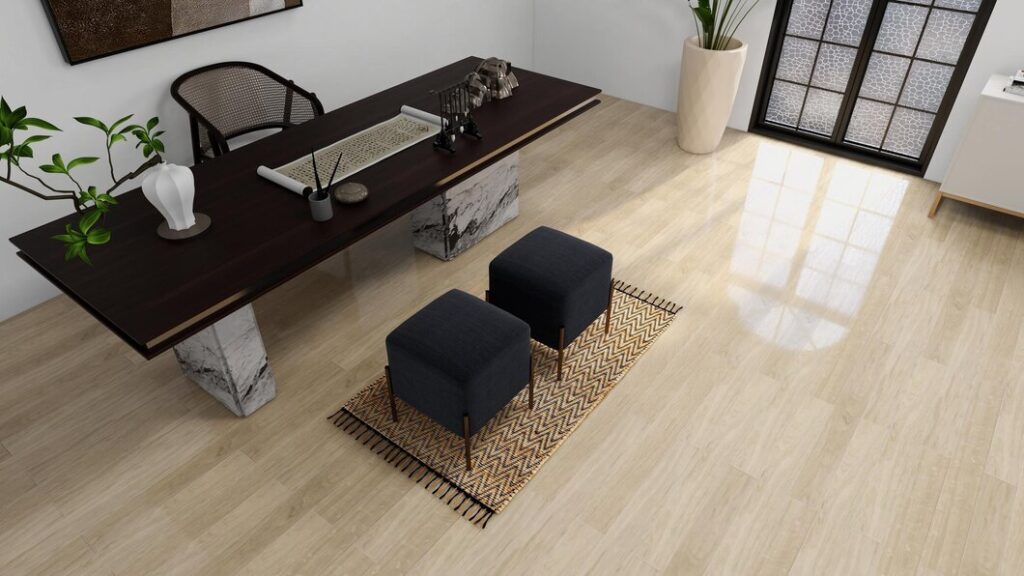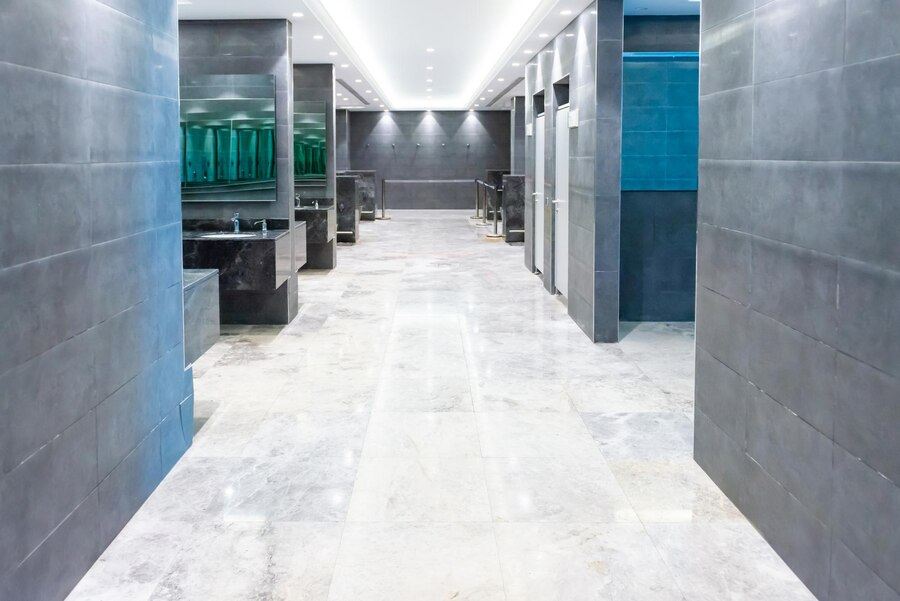Any company should invest in tile flooring because of its extended lifespan, decorative styles, and low maintenance needs. However, to keep the tiles’ brilliance and shine, they must be cleaned and maintained regularly.
This implies that if the tile floor is not maintained, dirt and dust will accumulate over time and cause scratches and damage to the tile. Thankfully, sealing the grout is always a good option because it shields the tile edges, adding to the floor’s longevity. Additionally, hiring professionals to clean the surface will keep everyone safer.
In this article, we will talk about;
- Commercial tile flooring
- Types of commercial tile flooring
- Cleaning preparations
- Effective cleaning techniques
- Maintenance tips
- Common mistakes to avoid
- How professional services can enhance your workspace
What is Commercial Tile Flooring?
Commercial tile flooring is a category of tiles made to withstand the traffic for business sites such as;
- Offices
- Hospitals
- Retail businesses
- Restaurants
From these above industries, it is clear that the demand for these tiles is high. Well-known materials in the composition include:
- Ceramic
- Vinyl
- Porcelain
Each one can be easily found as they all have different markets:
- Strength
- Cost
- Appearance
Types of Commercial Tile Flooring
Luxury Vinyl:
These high-traffic foot tiles are less difficult to maintain than carpets as they are sound-absorbing, water-resistant, and easier to clean. Luxury vinyl is a common choice for many, including;
- Hotels
- Kitchens
- Bathrooms
- Hospitals
- Restaurants
- Childcare centers
In addition, it enhances the look of retail spaces since it mimics stone or wood.
Porcelain Tile:
Porcelain tiles are made from refined clay and are known for their:
- Durability
- Resistance to stains, water, and scratches
They are best used in high-traffic business areas such as:
- Schools
- Restaurants
It is a strong option for modern spaces because of its thin body and resistive features.
Rubber Flooring:
Rubber is a soft cushiony floor that can go in:
- Stairwells
- Entryways
- Nurse stations
Rubber flooring helps reduce noise and alleviates employee fatigue, creating a more comfortable work environment. In public areas, its non-slip properties improve safety for visitors and staff alike.
Ceramic Tile:
Ceramic tile, a low-maintenance and easy-to-clean flooring option used for places like:
- Lounge areas
- Hallways
Its practicality makes it a popular choice in many facilities, as it requires minimal effort to maintain.
Despite its simplicity, ceramic tile does not compromise on aesthetic appeal. Tiles come in different designs and textures to suit various styles. However, its low heat retention can make it feel cold and less comfortable during winter.
Vinyl Composition Tile (VCT):
This type of flooring is remarkable for its affordability and ease of installation and is available in different patterns and colors. VCT can imitate:
- Timber – a wood with a high content of cellulose
- Stones or tiles of natural stone
- Ceramic Tiles
Due to its aesthetics, this flooring option is quite popular for installations in various commercial facilities.
Vinyl Sheet Flooring:
Vinyl sheets are a highly durable flooring, making them ideal for high-traffic areas. They are widely used in diverse settings such as:
- Entrance areas for offices
- Bathrooms
- Hotel lobbies
- Schools
How to Prepare Your Tile Floors for Cleaning?
For the effective cleaning of tile flooring, the following steps may be considered:
Manage the Space:
The initial step is rearranging movable furniture, removable surface coverings, etc. to create a clearing.
To Clean, Sweep, or Vacuum:
Use a vacuum cleaner or a broom to collect soil, dust, and small pieces of debris. This helps protect the tile surface from scratches during cleaning.
Other Safeguard Measures Needed:
How safe are loose tiles? Are there any damaged tiles? It’s a good idea to fix these problems before cleaning the room otherwise they will only add to your problems.
The Appropriate Selection of Cleaning Tools:
Use cleaning tools appropriate for the tile to eliminate the possibility of damaging the tile. Always check the labels to see if and where the items may be used.

How to Clean Commercial Vinyl Tile Flooring?
Use a Neutral Cleaner:
Regular cleaning of vinyl flooring is best done with low-pH cleaners that contain no alkali. Always avoid using acidic or abrasive cleaning agents.
Mop the Floor:
Always use a microfiber mop that is damp to wipe the surface. Using too much water will damage the vinyl flooring.
Perform Spot Treatments on Tough Areas:
For areas that don’t clean off easily add a little of a cleaning chemical and rub it away with a gentle soft bristle brush.
Finally, Rinse and Dry:
After cleaning the floor, rinse it with clear water and allow it to dry completely to prevent the risk of water damage.

How To Clean Commercial Ceramic Tile Flooring?
Sweep or Vacuum:
This will save you time from lots of scratches later during cleaning.
Pre Cleaning Solution Preparation:
It’s way easier than expected, just mix some warm water and detergent, and voila!
Sanding Down Areas Of Grout:
A grout line filled with stains will always have dust particles to get those stains out rub that part using a grout brush with a cleaning solution.
Mop the Tiles:
Use a mop to clean the tiles, ensuring all areas are evenly wiped. Once finished, rinse the tiles thoroughly with clean water to remove any leftover detergent residue.
Polish for Shine:
Polish for shine after washing, use a dry microfiber cloth to buff the surface of the tiles to give them a polished look.
Commercial Tile Floors Care & Maintenance Tips
- Regular scrubbing helps avoid a build-up of dirt particles.
- Reduce the dirt and debris on the tiles by placing mats at all entrances.
- Sealing the grout makes the tiles more resistant to stains and easier to clean.
- Take care of spills by wiping them immediately so they do not create a stain or damage the floor.
- Always schedule a professional cleaning for your tile floors.
Common Mistakes to Avoid When Cleaning Tile Floors
Using Too Much Water:
Make sure to mop out the tile with a damp cloth and thoroughly dry it. Using too much water can damage the tile and the layers underneath it.
Abrasive Cleaning Agents:
Do not use steel wool or harsh brushes as they can scratch tiles. Instead, use soft-bristled brushes or sponges.
Ignoring Grout:
Grout also requires attention. Scrub it at least once a year to prevent discoloration and the buildup of stains, keeping surfaces looking clean and fresh.
Sitting Spills:
Prevent stains and discoloration by promptly cleaning spills. Regular maintenance protects floors and preserves their appearance and durability.
Failing to Seal Tiles:
Tiles should be sealed after cleaning to prevent staining in prone areas like:
- Kitchens
- Bathrooms
Sealing also helps maintain the tile’s shine and extends its lifespan.
Not Hiring The Specialist Cleaners:
Hire specialists once a year for tile cleaning to improve the quality and appearance of your floors.
Transform Your Work Environment with Our Tile Cleaning Services
To enhance the conditions and look of your floors, why not use our tile cleaning services? Our staff is equipped with the latest methods and uses the latest cleaning compounds to ensure a neat and clean finish. Whether you are looking for periodic maintenance or a one-time deep cleaning, you will be assured of having a clean and hygienic area.
Moreover, professional tile cleaning targets hard-to-reach areas and dirt. Clean, polished tiles do a lot more for you in terms of aesthetics and sanitation. You can expect a professional team to provide commercial solutions for your business space.
FAQs
How to mop a commercial floor?
- Get rid of trash by sweeping or vacuuming the floor.
- First, mop the floor using a neutral pH cleaner dissolved in water.
- Be cautious and remove extra moisture to prevent the floor from staying wet.
- Use clean water, rinse the mop and repeat the mopping process.
- To prevent water from puddling or getting streaky, dry the floor well.
How do you clean commercial floors?
The cleaning method is dictated by the kind of flooring installed.
- Start by sweeping the floor to remove debris, then apply a suitable cleaner and mop with a small amount of water. This method works well for both vinyl and ceramic tiles.
- Hire professional cleaners with the necessary equipment and trained to perform deep cleanings.
What is the best cleaning solution for tile floors?
A pH-neutral cleaner is the best choice for cleaning tile floors. Do not use acidic or abrasive cleaners because they can damage the tiles.
How do you make tiles clean and shiny?
You can wash the tiles with a specific cleaning product and rinse them properly to allow them to shine. Use a dry microfiber towel to buff the surface or apply ceramic tile polish to beautify it even more.

